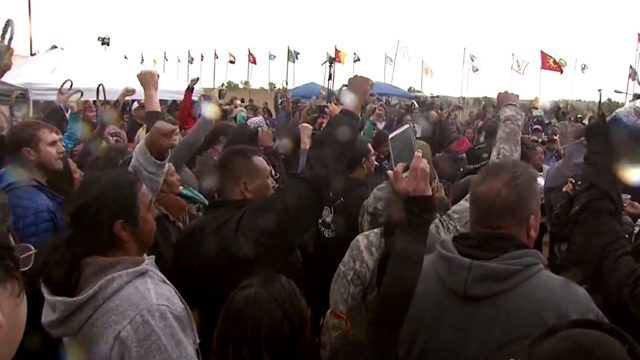(Daniel T’seleie in an undated photo was arrested at #StandingRock Sept. 14. Photo courtesy Daniel T’seleie)
Iman Kassam
APTN National News
When Daniel T’seleie went to support the Dakota Access Pipeline protest in early September, he had no idea he would be leaving in handcuffs.
But on September 14th, he and six other protesters were arrested and charged with felonies and misdemeanors for stopping construction on site.
“I’ve been charged with reckless endangerment, which is a Class C felony, and I’ve also been charged with disorderly conduct, trespassing, and obstruction of a government function” he told APTN.
T’seleie flew from the Northwest Territories to join the camp of protesters working with Standing Rock Sioux Tribe to halt construction on the controversial pipeline.
He has a very unique skillset that the camp of protesters needed.
T’seleie is part of a grassroots network of Indigenous volunteers who specialise in non-violent direct action training for indigenous communities.
The Standing Rock Sioux Tribal leadership invited T’seleie and his colleagues to North Dakota to train as many people as possible to work on the frontline.
“Some people say frontline, I say point of destruction – the places where they’re actually digging up earth with heavy equipment and destroying the planet,” said T’seleie. “People who engage in resistance at those sites will sometimes use things like a bike lock around their necks, chained to the equipment. People will design sometimes other types of equipment that are more difficult to cut off than chains and they will connect their arms and lock themselves together around specific parts of the equipment with the intention that, if they do this, the equipment cannot operate, and that shuts down construction for a day.”
See related stories: Standing Rock
According to T’seleie, every day that construction is shut down, these companies are losing money. This is part of the strategy to financially strain the pipeline, forcing investors to pull their funding.
At the Sacred Stone camp, his team set up a big canopy tent amidst the thousands of protesters spread out as far away as 160 kilometres away from the construction site, offering free two-hours training sessions on non-violent direct action.
“We give people the tools and skills they need to actually engage in non-violent direct action in a safe and respectful way” he said. “They talk about the different forms of violence, they role-play potential real life situations and coach each other on how to stay calm and de-escalate a situation in a non-violent fashion.
When he arrived in North Dakota, T’seleie and his team met with tribal leadership to work on direct action principles founded on respect for the land. Everyone who goes through their training program is taught those principles and requests from the tribe.
“That’s my primary focus and the reason I came here, to facilitate those discussions and help lead the training with a lot of the people on the ground.”
But in the early morning of Sept. 14, two people walked down to the pipeline construction site, and a group of 22 followed for support.
Daniel T’seleie was arrested at the site.
Protesters tied themselves to equipment hoping to stop construction for the day.
Just over five hours into the resistance, the police came and arrested T’seleie and six others.

“I was not surprised that there were police that responded to the scene” he said. “That makes sense given the situation. What’s surprising is the felony charge, a reckless endangerment charge. There was nothing about the situation or the actions we took that were dangerous or reckless or that could constitute reckless endangerment.”
His preliminary hearing is Tuesday Oct. 18. He says he is pleading not guilty to every charge and, as a strategic tactic, he will request a jury trial.
“If everybody wants a jury system and everyone pleads not guilty, it jams up the court system. Even when we were in jail, the inmates were advising us to flood the jails because they don’t have the space to hold that many people. It’s Morton County, it’s a small place, they don’t have that many jury trials a year.
They don’t have the capacity or the funding. This is way beyond the capacity of the court system.”
T’seleie is back in the Northwest Territories but leaves for North Dakota this weekend and plans to return to the camp where he will help people winterize their site, split firewood, and equip people with canvas tents and wood stoves.










